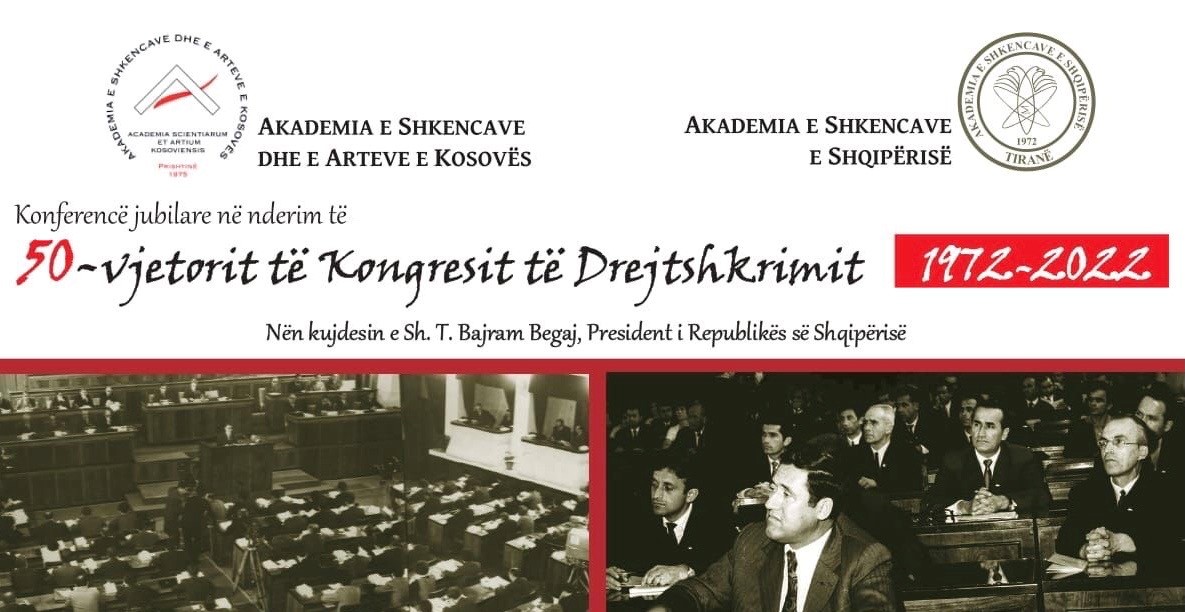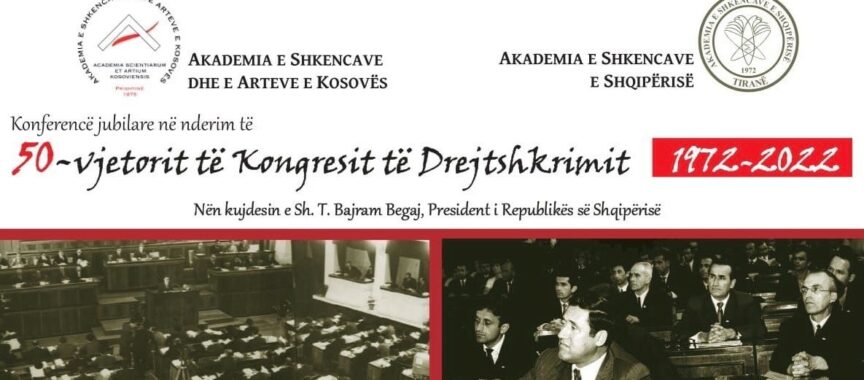Tirana, November 10, 2022
The speech of the Prime Minister of the Republic of Kosovo, Albin Kurti, read at the Jubilee Conference of the 50th anniversary of the Albanian Spelling Congress:
Dear President of the Republic of Albania, Mr. Bajram Begaj,
Honorable Prime Minister of the Republic of Albania, Mr. Edi Rama,
Dear First Deputy Prime Minister of North Macedonia, Mr. Artan Grubi,
Honorable President of the Academy of Sciences, Mr. Skender Gjinushi,
Honorable Chairman of the Academy of Sciences and Arts of Kosovo, Mr. Mehmet Kraja,
Dear professors and academics Valbona Toska, Emil Lafe, Matteo Mandala and Jani Thomai,
Dear attendees,
Ladies and gentlemen,
Brothers and sisters,
I am feeling lucky and very much honored to be able to address this Jubilee Conference of the 50th anniversary of the Albanian Spelling Congress. And I am sorry that I had to travel to Paris and I cannot be with you physically in Tirana.
Language for us Albanians is the foundation of identity and not just a means of communication. The history of the standardization of the Albanian language is closely related to the history of our national awareness, therefore the various stages of the process of crystallization of written Albanian are, at the same time, also stages of the crystallization of this consciousness. For the Albanians, the aim towards the unification of the written language, turned into a program that would also enable national political unification. This was the reason that for all Albanian writers, and especially for those from the Renaissance onwards, the idea of a common Albanian became the main patriotic project. But the road to achieve this goal it was not easy. It took a lot of effort, work, and dedication and not infrequently even sacrifice, so that Albanian could survive: to be written, taught and cultivated.
It is known that the standardization of a language means the work of reducing language variants to a standard variety. And the history of standardization in the world shows not only a great variety in the way of selection of the norm and codification, but also inevitable political implications in this process. One of these implications is that the choice of a language standard profoundly affects national political cohesion.
Exactly at the time when the debate about the creation of a common Albanian literary language began, – as it was called then, – at the end of the century 19, the social and political circumstances became very difficult. The Albanians were indeed under the rule of a monocentric administrative and political power, under the Ottoman Empire, but they had a polycentric linguistic state. Albanian was not only a not official language at this time, but it was also forbidden. And, when Albania declared its independence, in 1912, the Albanians moved to an administrative and political polycentrism, – because half of them fell under the rule of some neighboring states, where the Albanian language was still prohibited – to a possibility of planning towards a linguistic monocentrism.
The first important step happened with the organization of the Congress of Bitola in 1908, where the Albanian alphabet was approved. However, the real work of planning a standard Albanian language started with the establishment of the Albanian Literary Commission, in Shkodër, which worked during the years 1916-18, led by Gjergj Pekmezi and Luigj Gurakuqi.
It is true that within the Albanian language, for centuries, three literary languages had developed, the literary Georgian, the literary Toskretian and the literary Arberish, but the political circumstances for the Albanians were so difficult, so unfavorable, that it seemed impossible for the Albanians to cope both unfavorable political polycentrism and divisive linguistic polycentrism.
When the Albanian Literary Commission decided to base the standard language on the Albanian language, more important than which language was used as a base, was the creation of a common feeling and the familiarization of Albanians with the idea of what a single language would look like in practice standard for everyone, since this had never been tried before. At this point, the project of the “Albanian Literary Commission” was successful.
Even when the basis of the standard language was changed after the Second World War, many of the decisions of this “Commission” remained embedded in the foundations of this standard language, because, after all, it was about the rules of the Albanian language.
In this process of destandardization and standardization, which at first glance may seem like a harsh intervention of the state authority, if viewed from today’s perspective, it will be understood that it had undeniably positive effects, because it caused the confusion, the mixing of the two main languages literary, Gheg and Tosk, in a much more powerful way than this could happen in any other way. But this was what was happening internally, in Albania.
Externally, the period after the Second World War presented one of the most difficult and challenging phases in the planning of the common Albanian language. The severe political division in some countries, the impossibility of normal inter-Albanian communication for several decades and the functioning of Albanian as a standard language in Albania with one base, and as a standard language with another base in the Albanian lands in the former Yugoslavia, would be able to lead to an irreversible national division, both political and cultural. Fortunately, the Albanian language managed to overcome even this possible deep political division and achieve the goal that had started since the renaissance: establishing a standard Albanian language. This was crowned with the signature of 87 delegates of the Resolution of the Albanian Spelling Congress in 1972, which had been a dream of all our activists for centuries.
Based on these facts, the Spelling Congress of 1972, whose 50th anniversary we are now celebrating, had not only linguistic significance, but equally, if not more, political significance. Because, like many times in our history, actions and decisions about the Albanian language preceded political actions and decisions. This Congress was not only a continuation of the dedication of the revivalists, the work of the Albanian Literary Commission, but also a crowning of all those centuries-old efforts for a common Albanian.
The literary language or standard Albanian should not be conceived as rigid, it needs to be reformed to come closer to the way Albanian is spoken and written today, but even the reformation has as a prerequisite the mass acquisition of the literary language through public education and the media. Otherwise, in conditions where even those who finish university education make mistakes while writing literary Albanian, any reformation of this language would do more harm than good.
Literary Albanian as well as spoken Albanian in its diversity are faced with the challenges of online communications and social networks. Scientific and media institutions should study the risks and opportunities that information technology presents for Albanian and draft projects, even with the participation of private enterprise, for applications that are needed (e.g. online dictionaries for the literary language, or for different subjects, literary proofreaders etc.).
Despite the use of information technology, the book remains the best format for the formation, preservation and transmission of knowledge in the Albanian language. Kosovo and Albania, within the framework of the unification of policies and institutions, should prioritize the issue of distribution of Albanian books, enrichment and establishment of libraries, digitization of books, etc. Especially manuals for the correct use of literary Albanian or applications for this purpose should be offered for free through the electronic platforms of libraries or other institutions.
Since the lifespan of the Albanian language is so much intertwined with the political fate of our nation, the work for its further crystallization must continue with the same zeal and dedication from the younger generations. Only in this way, the Albanian language will be able to face the challenges that await it in the future. In this work, it is enough to follow the advice of the wise Professor, Eqrem Çabej, who ended his speech at the Spelling Congress with these words:
“[Linguists] will be guided by a high sense of responsibility. In the formulation of each rule, there will be the awareness that the work for a certain spelling is not for a few thousand people, but for four million people who have Albanian as their mother tongue.”
The four million Albanians of that time were the Albanians of all Albanian lands. Today, these Albanians have been added to several million more, so our responsibility must be even greater, our commitment even deeper.
Thank you!
Last modified: November 10, 2022

